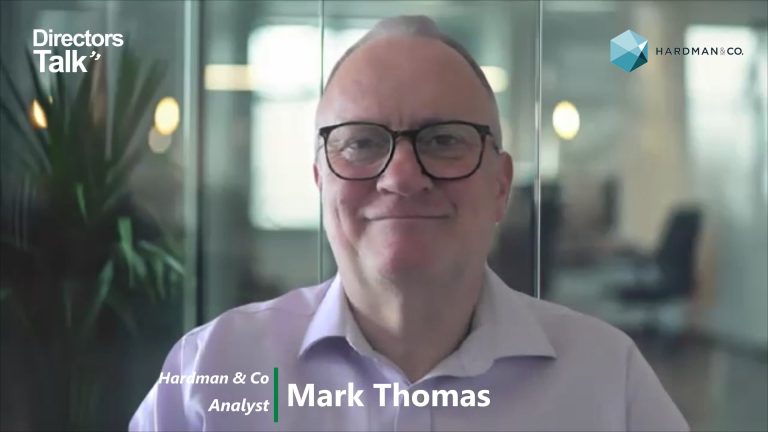Palace Capital (LON:PCA) is the topic of conversation when Hardman and Co’s Analyst Mike Foster caught up with DirectorsTalk for an exclusive interview.
Q1: PCA has reported results, what is Palace Capital and how were the results?
A1: PCA is a real estate investment trust all invested in the UK, around half the assets in the relatively strong sector of regional offices. There was a most important update on a large part of the portfolio. 10% of assets are invested in a scheme inside the city walls in York: mixed use residential and offices. The launch was in the early summer and it’s been selling over one a week. This is ahead of budget. Profits are taken when the flats complete and that’s next financial year.
Q2: So how were group-wide results?
A2: Real estate investors have been seeing stagnant capital values and that happened here: a small fall was anticipated and duly came about. But total return including income was 1.5% in the six months to September and that’s based on rightly cautious valuers. It modestly outperforms the standard benchmark, the MSCI quarterly index. The company, as ever, the first half was busy. It is an active asset optimiser through a large set of targeted small value-adding business plans. 17 lease events took place, impressively 25% above passing rent. Much more importantly, investors should stand back and look at what PCA is about. It seeks to outperform the peer group and benchmarks through resilient, growing, attractive income streams and it seeks cash-backed capital growth. What does that mean? Resilient and growing income streams mean it has no shopping centres and has a bias towards regional offices. Regional office supply is flat-lining as stock gets converted top other, residential uses. Not immune to economic uncertainty, nonetheless this underpins rents well. The office sector has a bit of an issue with the near-demise of WeWork, but that does not materially affect regional cities. Attractive income streams refers to the fact that the yield on the company’s portfolio is around 7%. We then should talk about the cash-backed capital growth.
Q3: You mentioned the company has a large development in York, would you call this business a ‘developer’?
A3: To a measured degree. Their policy is to generate shareholder value through good income streams and also to grow capital value. This latter comes from asset enhancement, improving the tenant base. It also – maybe less importantly – hopes to secure re-valuations by picking good locations and asset classes. This remains a staple tool for real estate to make money. But to be much more in control of timing, the company is also open to low-risk development.
Now, in this context, low risk – we believe – means three things. First, it assesses hundreds of opportunities and only buys a tiny amount. Within that tiny amount are portfolios being sold by vendors who want to move on. Sometimes these portfolios include latent developments. This happened at this York site. But they will only ever commit a modest part of its assets to development.
Q4: To quote, you say ‘Palace Capital is also open to low-risk development’? What is low risk?
A4: First, is the selection process. In this case the York site is inside the city walls, York is a strong regional market and the proof of the pudding is the good sales rate. Secondly, the greatest ‘cash-out’ sees the borrowing ratio (called loan to value) peak at 40%. Thirdly, the commercial element of this mixed use site is attractive for the company to hold. It takes a lettings risk but not a sales risk. This specific micro-market is resilient. So, the company is taking some risk, but a measured risk.
Q5: What does it get out of York?
A5: The successful end game is a 5% rise in the group’s total NAV (net asset value) per share and this is cash backed. It (over 75%) comes from cash profits. That cash can then be reinvested to raise the group’s ongoing income stream or it can in part do that and in part seed-corn future developments. Future developments will only happen if they are moderate risk and attractive returns.
So that means that, in answer to an earlier point, no, they are not a developer in the sense that its mission is not to develop. Its mission is to grow both income and capital values. It has a multi-club approach as it were. They have a clear mission and clear expertise in how to execute. It is not bound tightly in how it’s delivered.
Q6: Are there risks?
A6: This is real estate. But debt is really well under control, the positioning of PCA by asset class seems really strong and the development is going well. Market-wide lack of investor volumes is crimping valuations but does not seem to be making itself felt too much when looking at vacancies in the portfolio.
There are always risks in reletting and letting new space such as in York commercial which is about a quarter of a scheme with gross development value, we estimate at mid-60s, million pounds. To a degree, bad markets are eventually positive here as we see York definitely selling well and gearing getting back to below 30% on the back of that thereby offering fire-power. We could always be surprised but the last thing we would expect is PCA rushing in to deploy large amounts of that seedcorn capital, substantial as it is.
Q7: What has changed as a result of the financial announcement made by Palace Capital on 19th?
A7: We have brought forward our York development profits from the fiscal year to March 2022 into the fiscal year March 2021. We have upgraded on the York development.
The 90% of the business which is not York has seen total property return (income and capital) of a modest 3% annualised. It was 7.1% last full year. But this still moderately outperforms the MSCI index. 8 Dull markets, decent asset management, nice strength in the York development. What actually impacts positively?
By the next full fiscal year (March 2021) we anticipate earnings at 29 pence per share if those are calculated as profits from rents less all costs less finance (in the jargon, this is EPRA profits) plus you add on the cash profits we estimate coming in from housing sales in York. Not bad for a group paying a 19p dividend. Yet the shares give a 6.4% yield on that dividend.









































